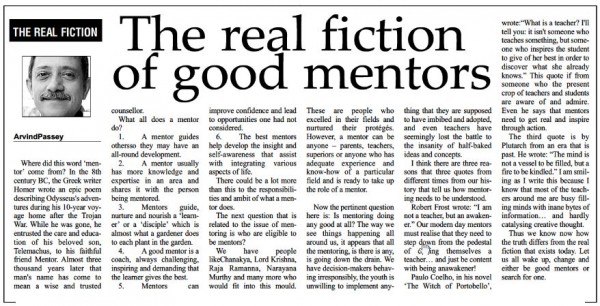Where did this word ‘mentor’ come from? In the 8th century BC, the Greek writer Homer wrote an epic poem describing Odysseus’s adventures during his 10-year voyage home after the Trojan War. While he was gone, he entrusted the care and education of his beloved son, Telemachus, to his faithful friend Mentor. Almost three thousand years later that man’s name has come to mean a wise and trusted counsellor.
What all does a mentor do?
- A mentor guides others so they may have an all-round development.
- A mentor usually has more knowledge and expertise in an area and shares it with the person being mentored.
- Mentors guide, nurture and nourish a ‘learner’ or a ‘disciple’ which is almost what a gardener does to each plant in the garden.
- A good mentor is a coach, always challenging, inspiring and demanding that the learner gives the best.
- Mentors can improve confidence and lead to opportunities one had not considered.
- The best mentors help develop the insight and self-awareness that assist with integrating various aspects of life.
There could be a lot more than this to the responsibilities and ambit of what a mentor does.
The next question that is related to the issue of mentoring is who are eligible to be mentors?
We have people like Chanakya, Lord Krishna, Raja Ramanna, Narayana Murthy and many more who would fit into this mould. These are people who excelled in their fields and nurtured their protégés. However, a mentor can be anyone – parents, teachers, superiors or anyone who has adequate experience and know-how of a particular field and is ready to take up the role of a mentor.
Now the pertinent question here is: Is mentoring doing any good at all? The way we see things happening all around us, it appears that all the mentoring, is there is any, is going down the drain. We have decision-makers behaving irresponsibly, the youth is unwilling to implement anything that they are supposed to have imbibed and adopted, and even teachers have seemingly lost the battle to the insanity of half-baked ideas and concepts.
I think there are three reasons that three quotes from different times from our history that tell us how mentoring needs to be understood.
Robert Frost wrote: “I am not a teacher, but an awakener.” Our modern day mentors must realise that they need to step down from the pedestal of calling themselves a teacher… and just be content with being anawakener!
Paulo Coelho, in his novel ‘The Witch of Portobello’, wrote: “What is a teacher? I’ll tell you: it isn’t someone who teaches something, but someone who inspires the student to give of her best in order to discover what she already knows.” This quote if from someone who the present crop of teachers and students are aware of and admire. Even he says that mentors need to get real and inspire through action.
The third quote is by Plutarch from an era that is past. He wrote: “The mind is not a vessel to be filled, but a fire to be kindled.” I am smiling as I write this because I know that most of the teachers around me are busy filling minds with inane bytes of information… and hardly catalysing creative thought.
Thus we know now how the truth differs from the real fiction that exists today. Let us all wake up, change and either be good mentors or search for one.


2013_02_04_The Real Fiction of Good Mentors
Arvind Passey
Article written on 31 January 2013
Published in ‘The Education Post’ dated 04 February 2013









2 comments
Aarthy says:
Feb 4, 2013
Very interesting post .. The origin of the word ‘mentor’ was a revelation .. I think it takes a lot of self confidence and humility to be a mentor .. People who are too full of themselves or get insecure about their protege’s abilities can never be mentors ..
Am really enjoying the variety in your posts and find them very informative too !
Arvind Passey says:
Feb 4, 2013
Thanks a lot, Aarthy… hope to keep reading your comments and suggestions on these and other newer posts.